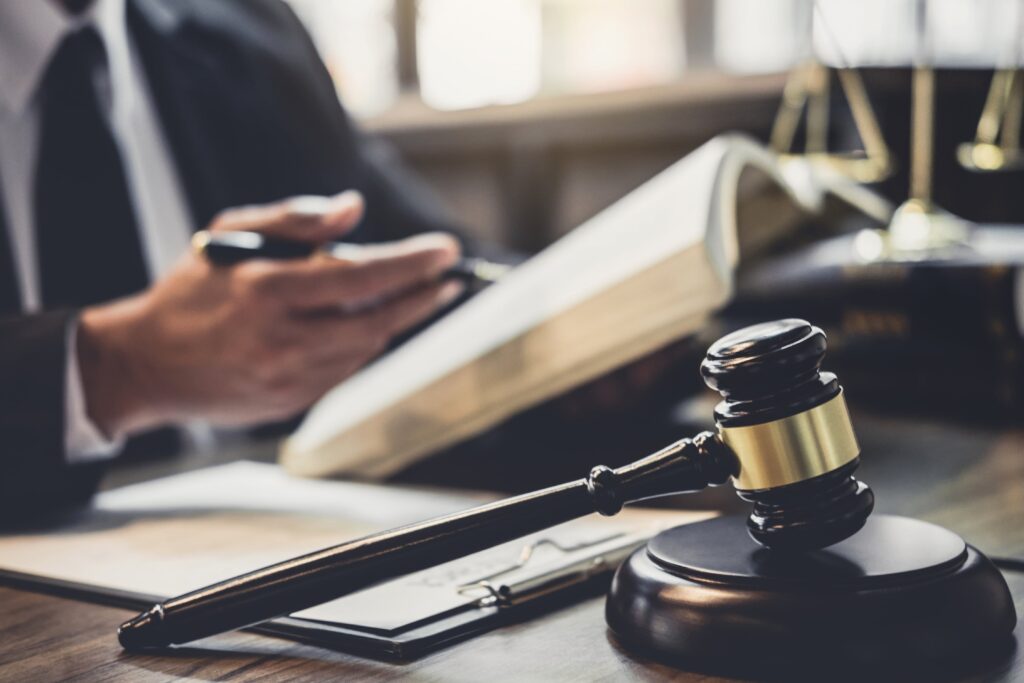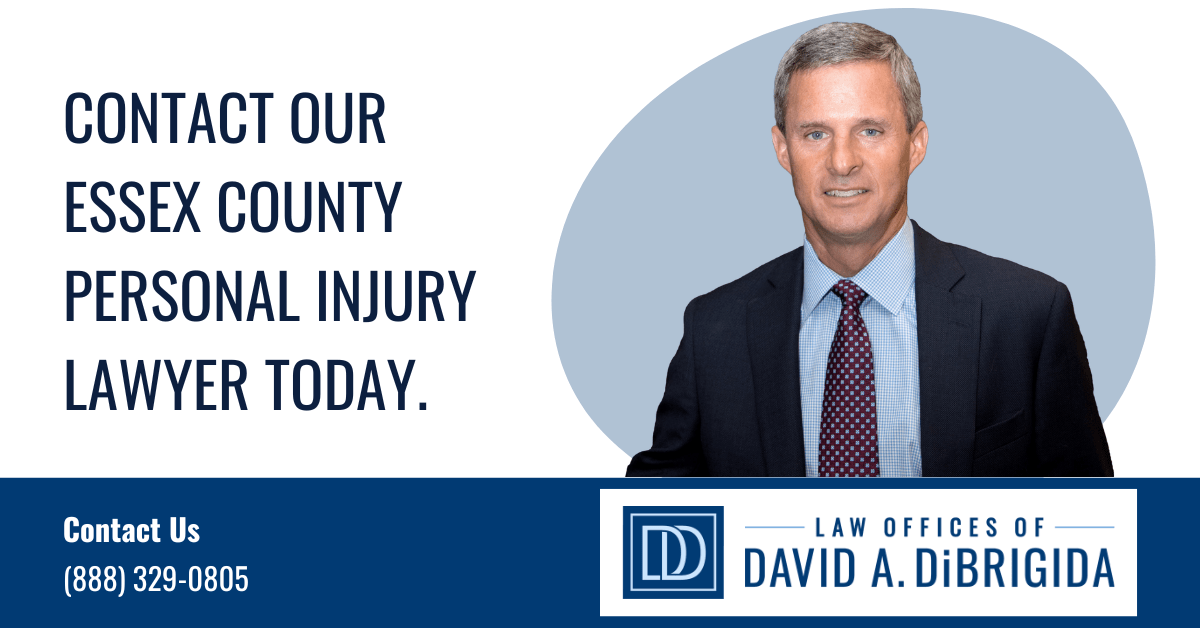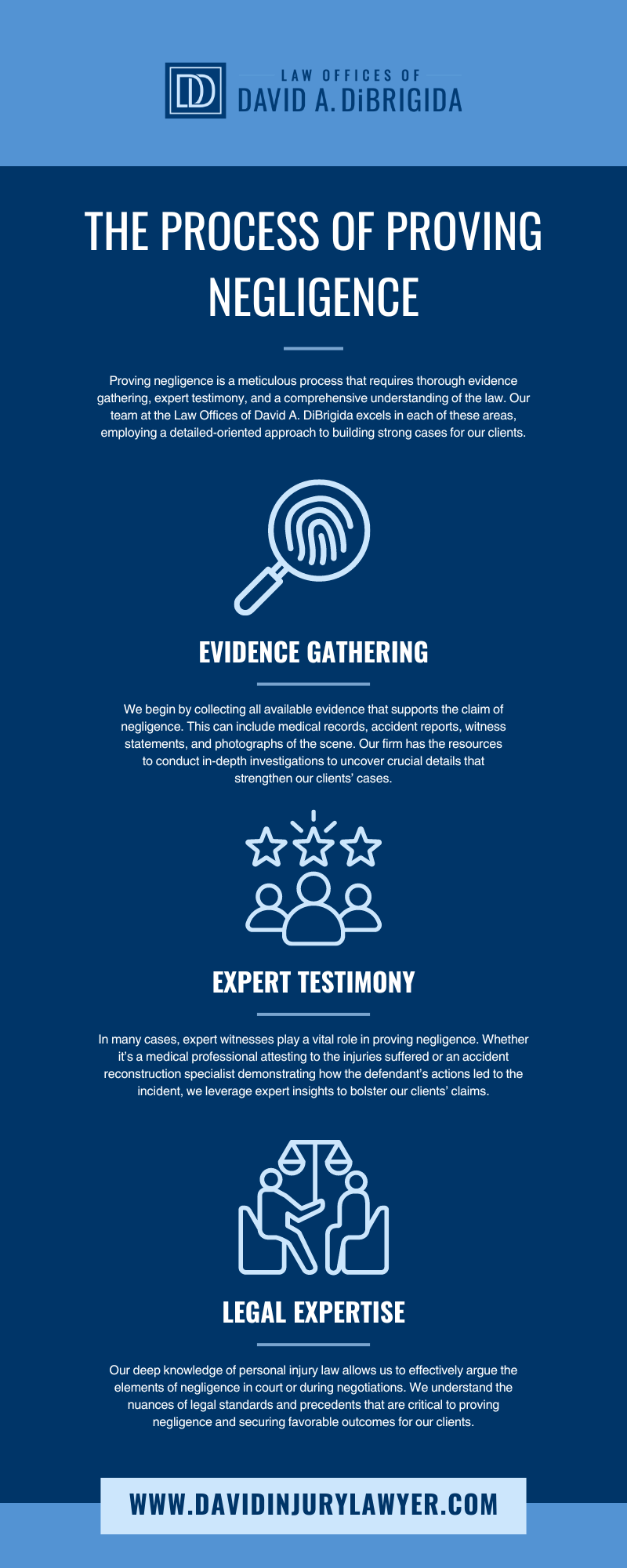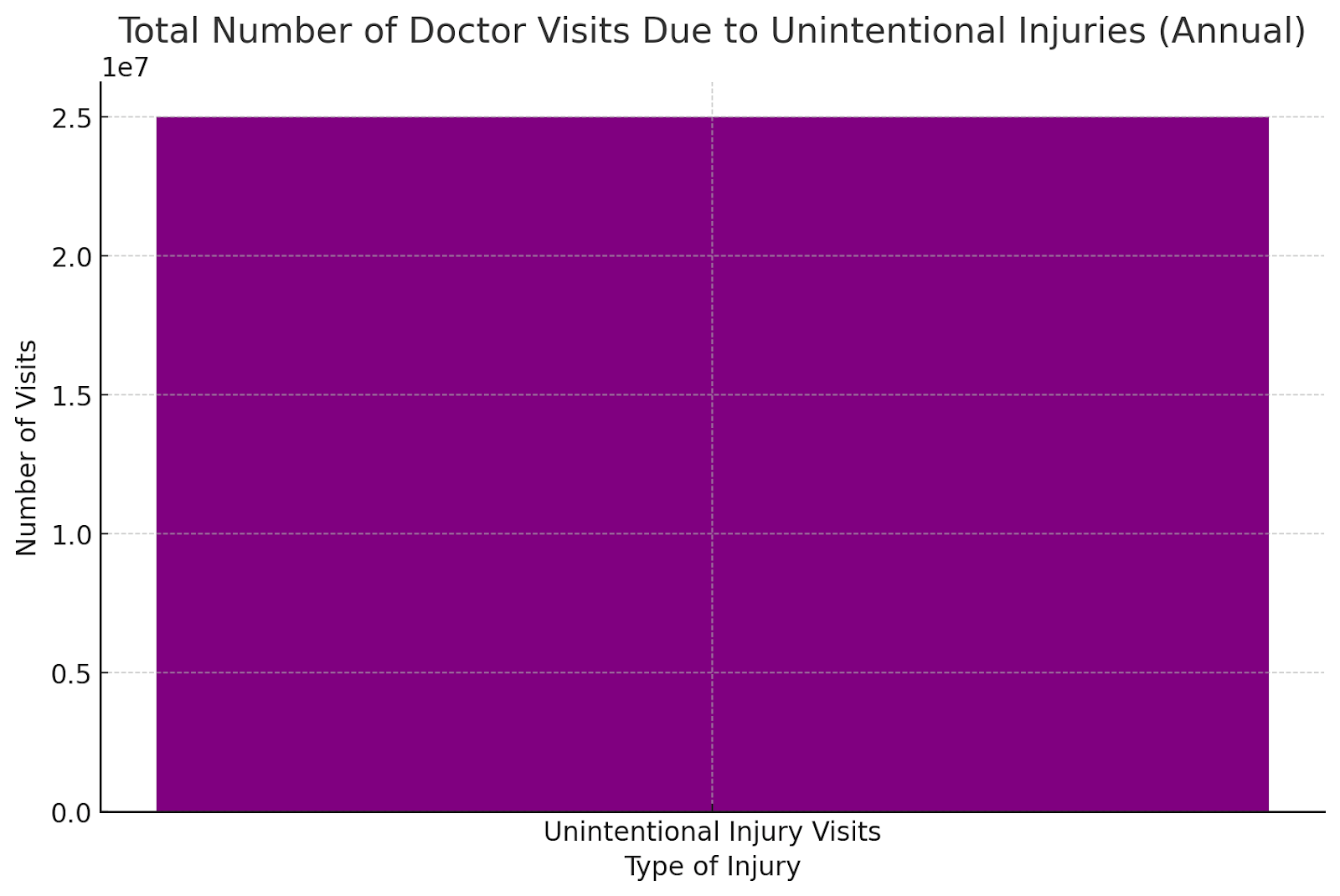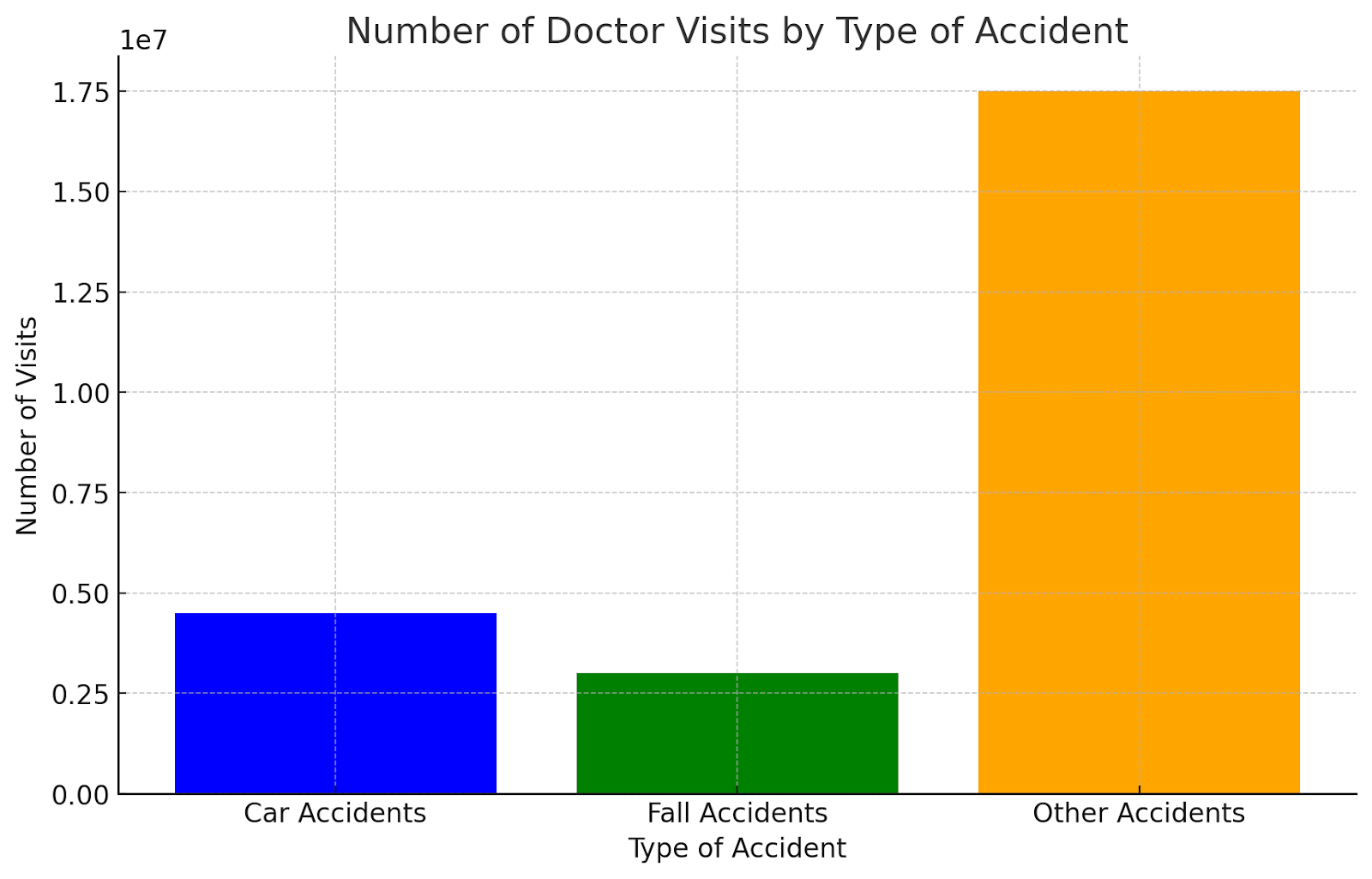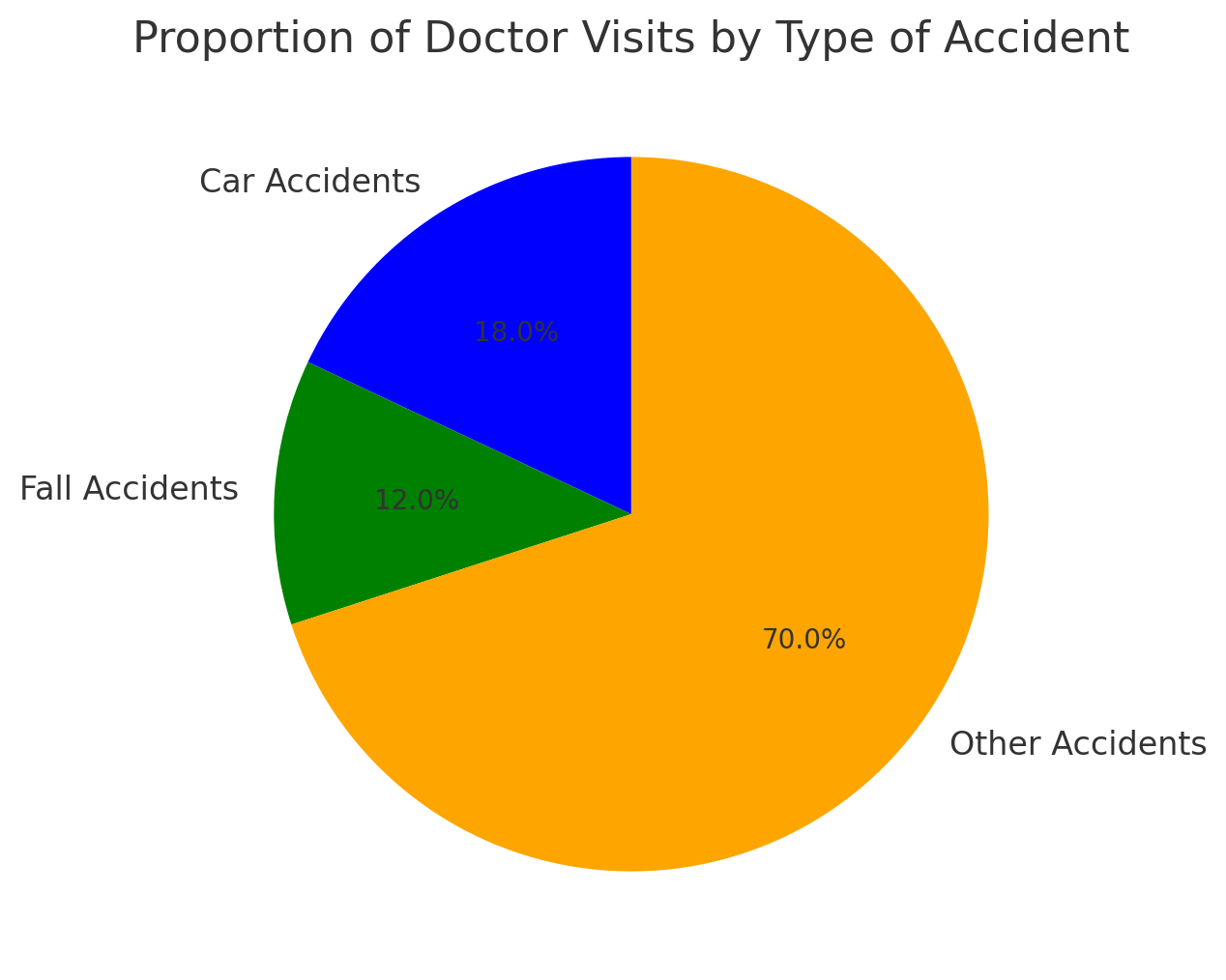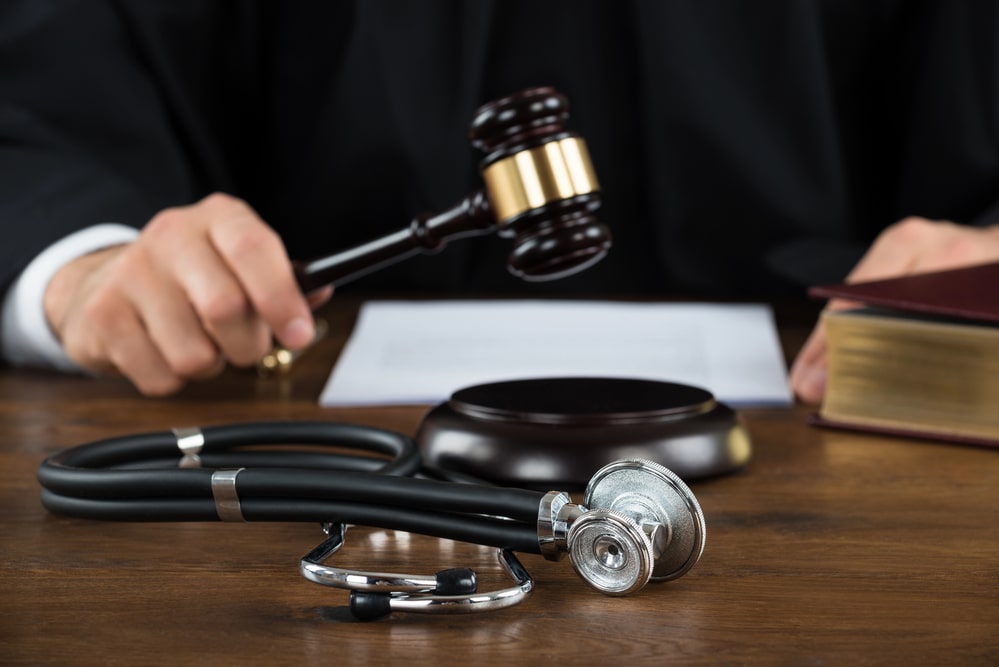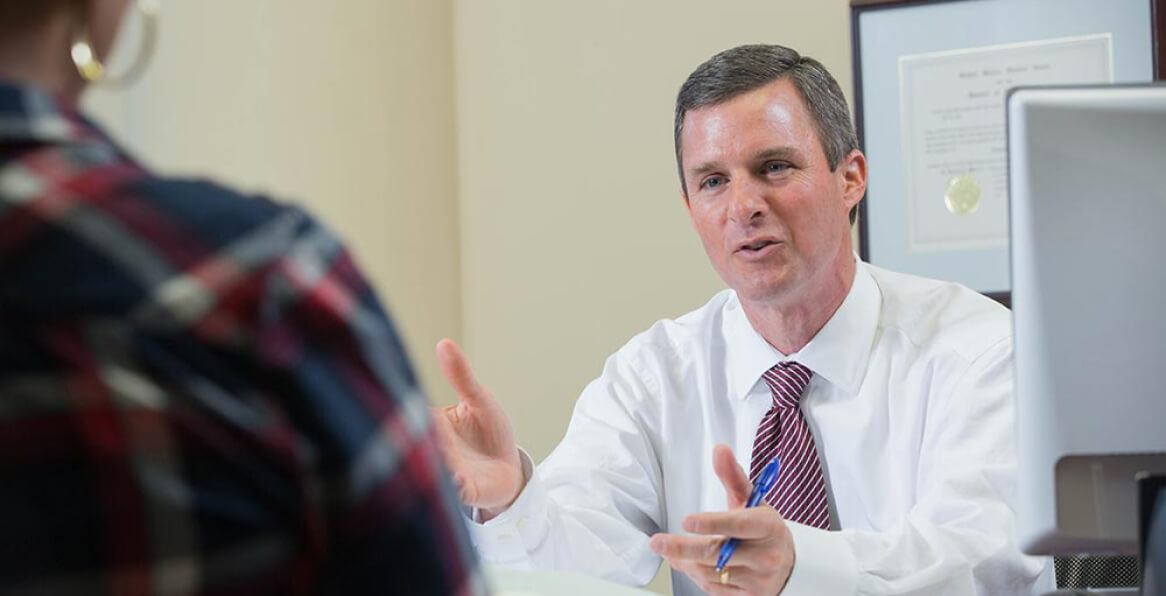
Personal Injury Lawyer Essex County, NJ

Pursuing Compensation After a Personal Injury Accident
Accidents happen every day. When you are harmed through no fault of you own, you should consider hiring our Essex County, NJ personal injury lawyer to represent your case. Whether you’re dealing with a hit-and-run, product liability case, medical malpractice, or workers’ compensation claim, you can rely on our attorney who has 30 years of personal injury law experience to advocate for financial justice on your behalf.
If you or a loved one has been injured due to someone else’s negligence, don’t wait to seek legal guidance. Contact the Law Offices of David A. DiBrigida today to discuss your case and explore your options for recovering the compensation you deserve.
Table of Contents
- Pursuing Compensation After A Personal Injury Accident
- Proving Negligence
- Types of Personal Injury Cases We Handle
- Essex County Personal Injury Infographic
- Essex County Personal Injury Statistics
- Personal Injury FAQs
- Essex County Personal Injury Glossary
- Law Offices of David A. DiBrigida, Essex County Personal Injury Lawyer
- Contact Our NJ Law Firm Today
Personal Injury Compensation
Understanding personal injury compensation is essential for anyone who has suffered harm due to the negligence or wrongdoing of another. This complicated area of law aims to restore the injured party to their pre-incident state, as much as possible, through financial restitution. We specialize in guiding our clients in Essex County, New Jersey, through the process of securing the compensation you deserve. Our approach is rooted in a deep commitment to justice and personalized legal service.
Economic Damages
These are quantifiable losses that include medical expenses, lost wages, and property damage. Economic damages are critical in making sure that the victim does not bear the financial burden of the injury. We meticulously document and calculate these losses to so that you receive full compensation.
Non-Economic Damages
Unlike economic damages, non-economic damages compensate for intangible losses such as pain and suffering, emotional distress, loss of enjoyment of life, and loss of consortium. These damages are subjective and require our skilled advocacy to quantify and argue effectively.
Punitive Damages
In cases of egregious negligence or intentional harm, punitive damages may be awarded to punish the wrongdoer and deter similar conduct in the future. While not applicable in all personal injury cases, our team is adept at identifying opportunities to pursue punitive damages on behalf of our clients.
The Personal Injury Compensation Process
The process of obtaining personal injury compensation involves several critical steps, each requiring strategic legal action.
Investigation and Documentation
The foundation of a successful personal injury claim is a thorough investigation and comprehensive documentation of the incident, injuries, and related expenses. Our attorneys excel in gathering evidence, consulting with medical professionals, and building compelling cases for our clients.
Negotiation with Insurance Companies
Most personal injury claims involve negotiations with insurance companies. Our experience in dealing with insurers enables us to negotiate assertively, aiming for settlements that truly reflect the extent of our clients’ losses and suffering.
We have been helping injury victims since 1992. Contact us today to schedule a free and confidential consultation with our knowledgeable and experienced lawyer.
Proving Negligence
Proving negligence is pivotal to securing compensation for victims, making liability a key factor in every personal injury case. At the Law Offices of David A. DiBrigida, we represent clients in Essex County, New Jersey, who have been harmed due to the carelessness of others. Our personal injury attorney knows how to prove negligence, an important step in holding the responsible parties accountable and recovering your damages.
Understanding Negligence
Negligence is defined as the failure to take reasonable care to avoid causing injury or loss to another person. In the context of personal injury claims, four key elements must be established to prove negligence:
- Duty of Care. It must be shown that the defendant owed you a duty of care. This means that the defendant had a legal obligation to act in a manner that would prevent harm to you or your loved one.
- Breach of Duty. We must demonstrate that the defendant breached this duty by acting negligently or failing to act in a way that a reasonably prudent person would have under similar circumstances.
- Causation. It must be proven that the defendant’s breach of duty directly caused your personal injuries. This involves showing a direct link between the defendant’s actions (or inaction) and the harm you suffered.
- Damages. Finally, the our lawyer must demonstrate that you suffered actual damages as a result of the defendant’s negligence. This can include physical injuries, emotional distress, and financial losses.
The Process of Proving Negligence
Proving negligence is a meticulous process that requires thorough evidence gathering, expert testimony, and a comprehensive understanding of the law. Our team excels in each of these areas, employing a detailed-oriented approach to building strong cases for our clients.
Evidence Gathering
We begin by collecting all available evidence that supports the claim of negligence. This can include medical records, accident reports, witness statements, and photographs of the scene. Our firm has the resources to conduct in-depth investigations to uncover key details that strengthen our clients’ cases.
Specialist Testimony
In many cases, professional witnesses play a vital role in proving negligence. Whether it’s a medical professional attesting to the injuries suffered or an accident reconstruction specialist demonstrating how the defendant’s actions led to the incident, we leverage professional insights to bolster our clients’ claims.
Legal Experience
Our deep knowledge of personal injury law allows us to effectively argue the elements of negligence in court or during negotiations. We understand the legal standards and precedents that are critical to proving negligence and securing favorable outcomes for our clients.
The New Jersey Statute of Limitations
In personal injury law, the statute of limitations varies by state and by the type of claim. In New Jersey, the statute of limitations for most personal injury cases is two years from the date of the injury. This means that individuals who have suffered harm due to someone else’s negligence have a two-year window in which to initiate legal proceedings. There are, however, exceptions to this rule that can extend or shorten this period, making it essential to consult with our Essex County personal injury lawyers to understand the specific timelines applicable to your case.
Exceptions to the Statute of Limitations
Several exceptions can affect the statute of limitations in personal injury cases. For example, in cases involving minors, the clock may not start until the minor reaches the age of majority. Similarly, in instances where the injury was not immediately discoverable, the “discovery rule” may apply, allowing the statute of limitations to begin from the date the injury was or should have been discovered. These and other exceptions underscore the importance of seeking legal advice to manage your case effectively.
The Importance of the Statute of Limitations
The statute of limitations serves several important purposes in the legal system. It makes sure that legal actions are pursued within a reasonable timeframe, thereby preventing the indefinite threat of litigation. It also helps verify that evidence remains fresh and reliable, which is imperative for a fair adjudication of the case. Failing to file a lawsuit within the prescribed period typically results in the loss of the right to sue.
Types of Personal Injury Cases We Handle
Personal injury law encompasses a wide array of situations where individuals are harmed due to the negligence or wrongdoing of others. It covers incidents from minor injuries to catastrophic events, each requiring a tailored approach to secure justice and maximum compensation for the affected parties. Our experience spans the full breadth of personal injury cases, offering professional legal representation to those in need.
Motor Vehicle Accidents
Motor vehicle accidents stand as a prominent category within personal injury law, including car accidents, motorcycle, truck, and pedestrian incidents. These accidents often result in significant physical, emotional, and financial distress for victims. Dealing with the complicated nature of insurance claims demands experienced legal assistance. We are committed to advocating for the rights of those impacted, so that you receive the compensation necessary for your recovery and rehabilitation.
Workplace Injuries
Workplace injuries encompass a range of incidents, from slip and fall accidents to exposure to hazardous materials, occurring in various employment settings. These cases can involve filing workers’ compensation claims or pursuing legal action against negligent parties. Our team is adept at addressing the unique challenges presented by workplace injuries, striving to secure fair outcomes for our clients.
Medical Malpractice
Medical malpractice cases arise when healthcare professionals fail to provide the standard of care expected, leading to patient harm. These cases are particularly challenging, requiring a deep understanding of both legal and medical principles.
Strict laws such as the federal HIPAA privacy rules, insurance regulations, and professional codes of ethics are all efforts on the part of governments to protect your health and rights when you become someone’s patient. Unfortunately, sometimes medical providers fall short of complying with the laws and rules that govern their practices. In cases like this, legal recourse has been established to give you, the patient, the opportunity to address and remedy the faulty actions of a provider or an institution. Our attorneys possess the specialized knowledge necessary to effectively represent victims of medical negligence, advocating for your right to maximum compensation for your injuries and losses.
Slip And Falls
Property owners have a legal obligation to keep their premises safe for visitors. Slip and fall accidents can occur due to a variety of hazards, such as wet floors, uneven surfaces, or inadequate lighting. Holding property owners accountable and proving negligence requires a strategic legal approach, which our team is well-equipped to provide.
Product Liability
When defective or dangerous products cause harm, product liability cases can be pursued. These cases may involve design defects, manufacturing errors, or inadequate warnings. We are skilled in overcoming the challenges of personal injury and product liability claims, working diligently to hold responsible parties accountable for the harm caused by their products.
Wrongful Death
Wrongful death claims are pursued when negligence or intentional acts result in the loss of life. These cases are emotionally challenging and legally complicated, necessitating compassionate yet aggressive legal representation. Our firm stands alongside grieving families, seeking justice and compensation to help them cope with their loss.
Let Us Be Your Advocate
Personal injury cases require not only legal skill but also compassion and dedication to the people behind each claim. Whether you’ve suffered harm in a motor vehicle accident, workplace incident, medical malpractice case, or another form of negligence, having trusted legal guidance can make all the difference. Our firm is committed to protecting your rights, holding negligent parties accountable, and pursuing the compensation you deserve for your injuries and losses. Your recovery begins here—reach out today to set up a time to discuss your case.
Essex County Personal Injury Infographic
Essex County Personal Injury Statistics
According to the Centers for Disease Control and Prevention (CDC), there are 25 million trips to the doctor every year by people who have suffered an unintentional injury. The two most common accidents that result in unintentional injuries are car accidents, accounting for more than 4.5 million visits, and fall accidents, accounting for 3 million. Other types of accidents include product liability, malpractice, and job injuries.
Personal injury FAQs
Suffering an injury because of someone else’s negligence can be an overwhelming experience, leaving you with medical bills, lost income, and uncertainty about the future. Understanding your legal rights and options is an important first step toward recovery. To help you make informed decisions, our New Jersey personal injury lawyer has answered some of the most frequently asked questions about personal injury claims, including what qualifies as a claim, how fault impacts compensation, and what types of damages you may be entitled to recover.
What types of accidents qualify for a personal injury claim?
Personal injury claims can arise from a variety of accidents, including but not limited to vehicle accidents, slip and falls, workplace accidents, medical malpractice, and product liability cases. Essentially, any incident where an individual is injured due to the negligence or wrongdoing of another party can potentially qualify for a personal injury claim.
Can I still receive compensation if I was partially at fault for my injury?
Yes, New Jersey follows a comparative negligence rule, which means you can still recover compensation even if you were partially at fault for the accident. However, your compensation will be reduced by the percentage of fault attributed to you. For example, if you are found to be 20% at fault for the accident, your compensation will be reduced by 20%.
What types of damages can I recover in a personal injury lawsuit?
In a personal injury lawsuit, you may be able to recover various types of damages, including medical expenses, lost wages, pain and suffering, emotional distress, and loss of enjoyment of life. In some cases, punitive damages may also be awarded if the defendant’s actions were particularly egregious. Our injury attorney carefully calculates the damages in your personal injury case to secure just compensation.
Do I need a personal injury lawyer to file a claim?
While you are not legally required to have a lawyer to file a personal injury claim, it is highly recommended. Personal injury laws can be complicated, and handling the legal system on your own can be challenging. Our qualified personal injury lawyer can provide valuable guidance, help you understand your rights, and increase your chances of securing a fair compensation.
Come To Us With Your Legal Questions
At our firm, we’re committed to helping victims pursue the compensation they deserve for their physical, emotional, and financial losses. Our experienced legal team will review your case, explain your options, and guide you through every step of the process. Contact us today to address your questions and learn how we can help you move forward.
Essex County Personal Injury Glossary
Legal terminology can be challenging, and as your New Jersey personal injury lawyer, we aim to make the legal process more understandable for our clients. Below, we’ve provided clear definitions and explanations of some commonly used legal terms in personal injury cases to help you better understand your rights.
Punitive Damages
Punitive damages are additional sums awarded in a lawsuit when the defendant’s conduct is found to be particularly reckless or intentional. Unlike compensatory damages, which are meant to cover losses like medical bills or lost income, punitive damages aim to penalize the wrongdoer and prevent similar actions in the future. In personal injury cases, courts may award punitive damages when it’s shown that the defendant’s behavior was especially malicious or egregious, going beyond mere negligence. These damages are not guaranteed and are typically only awarded in cases where the actions were willfully harmful.
Duty of Care
Duty of care is the legal obligation to act reasonably to avoid causing harm to others. In personal injury cases, this concept is fundamental. For instance, drivers have a duty to operate their vehicles safely to protect other road users. If it can be proven that a defendant failed in their duty of care — such as a distracted driver who was texting while driving and caused an accident — it can establish the foundation for a negligence claim. Showing that this duty was breached is often one of the first steps in proving liability in a personal injury lawsuit.
Vicarious Liability
Vicarious liability holds one party accountable for the actions of another, usually in an employer-employee context. For instance, if an employee causes an accident while performing their job duties, the employer may also be held liable. This principle applies when it can be shown that the employee was acting within the scope of their employment at the time of the incident. In cases where vicarious liability is applicable, it expands the scope of potential compensation sources for injured parties. For example, in a rideshare accident, the rideshare company could be held responsible for the negligent actions of its driver if they were on duty when the accident occurred.
These legal concepts are influential in personal injury cases and affect how claims are pursued. We believe that understanding these terms can help clients feel more informed and prepared when seeking compensation for their injuries. If you have any questions about how these terms might relate to your specific case, we’re here to help.
Medical Privacy Breach
A medical privacy breach occurs when a healthcare provider or institution fails to protect a patient’s confidential health information. Federal regulations like the Health Insurance Portability and Accountability Act (HIPAA) establish strict rules for safeguarding patient data. Breaches can include unauthorized access to medical records, sharing patient information without consent, or mishandling sensitive documents. These violations can lead to emotional distress and loss of trust in healthcare providers. Patients who experience such breaches may have legal options to pursue damages for any harm caused.
Informed Consent
Informed consent is the process by which healthcare providers must explain the risks, benefits, and alternatives of a medical procedure or treatment to a patient before proceeding. This principle supports patients in making a knowledgeable decision about their care. If a medical provider performs a procedure without obtaining proper consent, and the patient suffers harm as a result, it may lead to legal action. In personal injury cases, proving the absence of informed consent can be essential when pursuing claims related to surgical errors, experimental treatments, or medication administration.
Third-Party Claims
Third-party claims arise when an individual injured at work or elsewhere seeks compensation from a party other than their direct employer. For example, if a delivery driver is injured by a defective vehicle part, they may file a claim against the manufacturer rather than the employer. These claims are common in construction accidents, product-related injuries, and cases involving multiple parties. Third-party claims can provide additional compensation beyond what is available through workers’ compensation or insurance policies.
Hazardous Conditions
Hazardous conditions refer to unsafe environments that can cause injury, often forming the basis of premises liability cases. Examples include wet floors without warning signs, broken staircases, poorly lit areas, or debris on walkways. Property owners have a responsibility to address these dangers promptly. If someone is injured due to a hazardous condition, they may have the right to pursue a claim for medical expenses and other losses related to the injury. Establishing the presence of a dangerous condition and showing that the owner knew or should have known about it is critical in these cases.
Failure to Diagnose
Failure to diagnose occurs when a healthcare provider misses or delays identifying a medical condition, leading to a worsening of the patient’s health. This issue can be grounds for legal action when timely diagnosis could have prevented further harm. Common examples include failing to recognize symptoms of a heart attack, cancer, or infections. Proving this type of claim involves demonstrating that another competent provider would have made the correct diagnosis under similar circumstances. Failure to diagnose cases highlight the importance of thorough medical evaluations and timely treatment.
Law Offices of David A. DiBrigida, Essex County Personal Injury Lawyer
101 Eisenhower Pkwy, Suite 100 Roseland, NJ 07068
Contact Our NJ Law Firm Today
At the Law Offices of David A. DiBrigida, we understand the profound impact a personal injury can have on an individual’s life and the lives of their loved ones. Our dedicated team is committed to providing compassionate and comprehensive legal representation to those affected by personal injuries, so that you receive the justice and compensation you deserve. With years of experience and deep knowledge of New Jersey’s personal injury laws, we handle the challenges of each case with professionalism and a relentless pursuit of your best interests. We offer free consultations. Trust our Essex County personal injury lawyer to be your advocate, standing by your side every step of the way.
